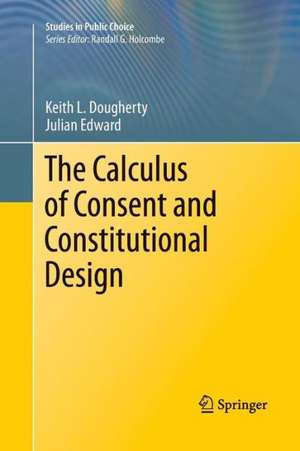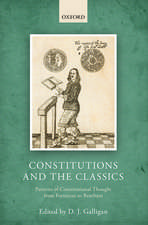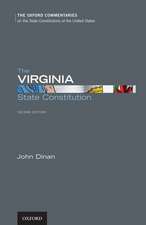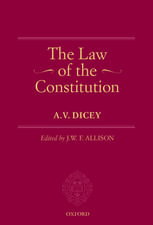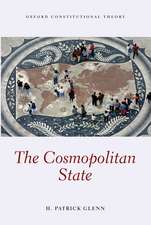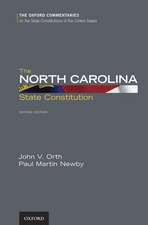The Calculus of Consent and Constitutional Design: Studies in Public Choice, cartea 20
Autor Keith Dougherty, Julian Edwarden Limba Engleză Paperback – 19 apr 2013
The book begins by showing how contractarian ideals can be used to justify choices about decision-making. It then carefully defines several concepts employed by Buchanan and Tullock and shows why the relationships between these concepts may not be as closely linked as Buchanan and Tullock first thought. This provides a backdrop for analyzing the three phases of constitutional decision-making: 1) the constitutional phase, where rules for constitutional decision making must be justified; 2) the legislative phase, where the optimal k-majority rule is analyzed; and 3) the electoral phase, where the optimal voting rule for largeelectorates and open alternatives are determined. These phases differ by context and sources of legitimacy. Computational models and analytic techniques are introduced in each of these chapters. Finally, the book concludes with statements about the significance of the research for the creation of constitutions more broadly.
| Toate formatele și edițiile | Preț | Express |
|---|---|---|
| Paperback (1) | 632.37 lei 6-8 săpt. | |
| Springer – 19 apr 2013 | 632.37 lei 6-8 săpt. | |
| Hardback (1) | 637.59 lei 6-8 săpt. | |
| Springer – 6 apr 2011 | 637.59 lei 6-8 săpt. |
Din seria Studies in Public Choice
-
 Preț: 542.84 lei
Preț: 542.84 lei - 18%
 Preț: 958.38 lei
Preț: 958.38 lei - 20%
 Preț: 579.92 lei
Preț: 579.92 lei - 18%
 Preț: 780.82 lei
Preț: 780.82 lei -
 Preț: 395.09 lei
Preț: 395.09 lei - 5%
 Preț: 370.58 lei
Preț: 370.58 lei -
 Preț: 381.81 lei
Preț: 381.81 lei - 18%
 Preț: 1228.77 lei
Preț: 1228.77 lei - 15%
 Preț: 637.46 lei
Preț: 637.46 lei - 18%
 Preț: 942.63 lei
Preț: 942.63 lei - 15%
 Preț: 640.71 lei
Preț: 640.71 lei - 15%
 Preț: 633.53 lei
Preț: 633.53 lei - 18%
 Preț: 945.62 lei
Preț: 945.62 lei - 20%
 Preț: 560.55 lei
Preț: 560.55 lei - 18%
 Preț: 947.50 lei
Preț: 947.50 lei - 15%
 Preț: 635.15 lei
Preț: 635.15 lei - 15%
 Preț: 634.49 lei
Preț: 634.49 lei - 15%
 Preț: 635.01 lei
Preț: 635.01 lei - 15%
 Preț: 638.89 lei
Preț: 638.89 lei -
 Preț: 381.81 lei
Preț: 381.81 lei - 15%
 Preț: 640.88 lei
Preț: 640.88 lei -
 Preț: 385.62 lei
Preț: 385.62 lei -
 Preț: 393.13 lei
Preț: 393.13 lei - 15%
 Preț: 697.00 lei
Preț: 697.00 lei - 15%
 Preț: 586.70 lei
Preț: 586.70 lei -
 Preț: 389.31 lei
Preț: 389.31 lei - 15%
 Preț: 643.84 lei
Preț: 643.84 lei - 18%
 Preț: 727.00 lei
Preț: 727.00 lei
Preț: 632.37 lei
Preț vechi: 743.97 lei
-15% Nou
Puncte Express: 949
Preț estimativ în valută:
121.02€ • 125.88$ • 99.91£
121.02€ • 125.88$ • 99.91£
Carte tipărită la comandă
Livrare economică 14-28 aprilie
Preluare comenzi: 021 569.72.76
Specificații
ISBN-13: 9781461428435
ISBN-10: 1461428432
Pagini: 132
Ilustrații: XII, 120 p.
Dimensiuni: 155 x 235 x 7 mm
Greutate: 0.2 kg
Ediția:2011
Editura: Springer
Colecția Springer
Seria Studies in Public Choice
Locul publicării:New York, NY, United States
ISBN-10: 1461428432
Pagini: 132
Ilustrații: XII, 120 p.
Dimensiuni: 155 x 235 x 7 mm
Greutate: 0.2 kg
Ediția:2011
Editura: Springer
Colecția Springer
Seria Studies in Public Choice
Locul publicării:New York, NY, United States
Public țintă
ResearchCuprins
Introduction.- Original Theories and Current Studies.- Clarifying Concepts.- Constitutional Decision Making.- Legislative Decision Making.- Electoral Decision Making.- Conclusion.
Recenzii
"The Calculus of Consent is one of the founding documents of the Public Choice school, and one of the most important books in political science in the last century. So it takes an ambitious book to promise to extend, and in some cases correct, the Buchanan and Tullock work. But Dougherty and Edward deliver on that promise. Make no mistake: this is much more than a reevaluation and update of the classic work. Dougherty and Edward bring these classic debates back to life, using the most recent literature and techniques. This book will be on dozens of graduate reading lists within a year of being published." - Michael Munger, Professor of Political Science and Professor of Economics, Duke University and Past President, Public Choice Society
"Dougherty and Edwards have written an excellent book. Its title echoes the classic work by Buchanan and Tullock. The authors re-examine, formalize and provide new insights into some of the main issues addressed in that classic and examine alternative properties of various electoral mechanisms. This book will be of significant interest to both political scientists and practitioners." - Annick Laruelle and Federico Valenciano, University of the Basque Country and Ikerbasque, authors of Voting and Collective Decision (2008)
"Dougherty and Edwards have written an excellent book. Its title echoes the classic work by Buchanan and Tullock. The authors re-examine, formalize and provide new insights into some of the main issues addressed in that classic and examine alternative properties of various electoral mechanisms. This book will be of significant interest to both political scientists and practitioners." - Annick Laruelle and Federico Valenciano, University of the Basque Country and Ikerbasque, authors of Voting and Collective Decision (2008)
Textul de pe ultima copertă
Buchanan and Tullock’s seminal work, The Calculus of Consent, linked economic methodology to substantive questions in political science. Among the major contributions of their book is a connection between constitutional decision making and contractarianism, a philosophical tradition that proponents believe can give institutions legitimacy. In other words, a major contribution of their book is a clear connection between empirical decision making and normative principles. The current book formalizes and extends their foundational ideas as it attempts to show how economic and philosophical arguments about the "best" voting rules can be used to improve constitutional design. It informs debates about constitutional political economy in comparative politics, democratic theory, and public choice. Political scientists often ask questions about what causes a nation to seek a new constitution, how constitutions are made, and what factors allow for corrupt decision making. The Calculus of Consent and Constitutional Design bridges the gap between normative questions about which institutions are most efficient and fair and empirical questions about how constitutions are formed. This provides a benchmark to help create better constitutions and informs empirical research about what institutions are most likely to succeed.
The book begins by showing how contractarian ideals can be used to justify choices about decision-making. It then carefully defines several concepts employed by Buchanan and Tullock and shows why the relationships between these concepts may not be as closely linked as Buchanan and Tullock first thought. This provides a backdrop for analyzing the three phases of constitutional decision-making: 1) the constitutional phase, where rules for constitutional decision making must be justified; 2) the legislative phase, where the optimal k-majority rule is analyzed; and 3) the electoral phase, where the optimal voting rule for largeelectorates and open alternatives are determined. These phases differ by context and sources of legitimacy. Computational models and analytic techniques are introduced in each of these chapters. Finally, the book concludes with statements about the significance of the research for the creation of constitutions more broadly.
The book begins by showing how contractarian ideals can be used to justify choices about decision-making. It then carefully defines several concepts employed by Buchanan and Tullock and shows why the relationships between these concepts may not be as closely linked as Buchanan and Tullock first thought. This provides a backdrop for analyzing the three phases of constitutional decision-making: 1) the constitutional phase, where rules for constitutional decision making must be justified; 2) the legislative phase, where the optimal k-majority rule is analyzed; and 3) the electoral phase, where the optimal voting rule for largeelectorates and open alternatives are determined. These phases differ by context and sources of legitimacy. Computational models and analytic techniques are introduced in each of these chapters. Finally, the book concludes with statements about the significance of the research for the creation of constitutions more broadly.
Caracteristici
Illustrates how computer based models can help us better understand political science and how they can be used to extend rational choice theory Connects normative theories of how to make better constitutions with the empirical theories of which constitutions succeed Carefully re-evaluates Buchanan and Tullock’s seminal work The Calculus of Consent Provides a theoretical apparatus for analyzing several of the claims made by other scholars Includes supplementary material: sn.pub/extras
